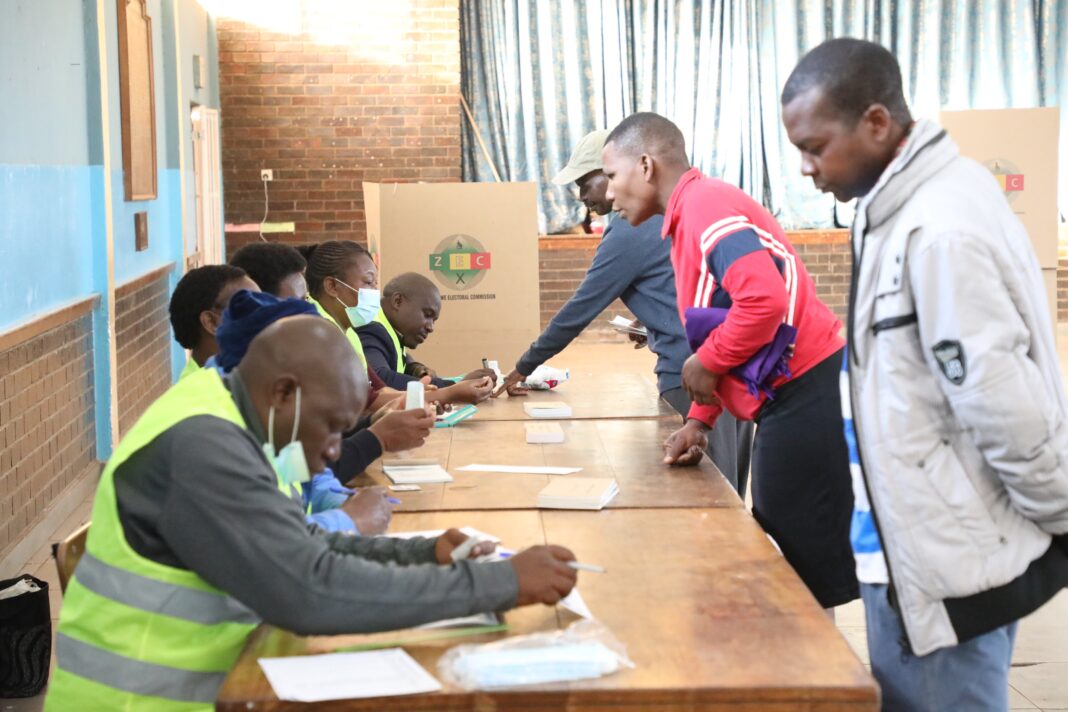Voting is underway in Zimbabwe’s presidential and parliamentary elections with the state of the economy dominating key campaign messages.
Voting day has been declared a holiday to as many voters to participate in the electoral process. Polling stations opened at 05:00 GMT and expected to close 17:00 GMT.
This is the first election in Zimbabwe since the death of its first president Robert Mugabe who died in 2019 two years after he was ousted in a military takeover.
Some 6.62 million registered voters are expected to cast their ballot in the election which has President Emmerson Mnangagwa facing 10 other challengers.
More 📸 of the 🇿🇼🗳️👀 as the AU-COMESA Election Observation Mission Head, @GEJonathan and team continue to observe as #ZimDecides2023 #ZimbaweVotes2023@comesa_lusaka pic.twitter.com/j9unLl5UTd
— African Union Political Affairs Peace and Security (@AUC_PAPS) August 23, 2023
Key contenders
President Mnangagwa is seeking re-election with his main challenger being Nelson Chamisa of the main opposition Citizens Coalition for Change (CCC).
The two men went head-to-head in the previous election in 2018 with Mnangagwa winning in tight race.
The opposition alleged the elections were rigged and the country’s constitutional court had to uphold Mnangagwa’s victory.
Nelson Chamisa has high hopes of emerging victorious. His party said it expected to end 43-year rule of the Zanu-PF party.
But the government believes that Zimbabweans will give President Mnangagwa another term in office despite criticisms about his management of the economy.
The campaign has been marked by the arrests of activists from the opposition Citizens’ Coalition for Change, which has been given little exposure on state media.
Police have warned voters to leave the polling stations after casting their ballot, after some NGOs urged Zimbabweans to defend their vote against manipulation.
Police have been deployed around the country to maintain peace and order, according to police chief Godwin Matanga who insisted the pre-election period had been largely peaceful.
Opposition parties though disagree as they allege of abuses and violence at their rallies.
Zimbabwe is witnessing currency shortages, high levels of inflation and unemployment rates, making living conditions unbearable for many.
Key issues for the elections
The annual inflation reached 176% in June with figures out this week showing it has dipped to 77.2% from 101.3% in July.
“Unlike in 2018, when [the president] had the advantage of being a hero of the November 2017 coup and the general feeling of giving him a chance, this time around he has demonstrated that … he has no plan to make things better as shown by his failure to even pen a manifesto,” Bekezela Gumbo, principal researcher the Harare-based think-tank Zimbabwe Democracy Institute, told Al Jazeera.
But Eldred Masunungure, director of the Mass Public Opinion Institute (MPOI) and a lecturer in governance and public management at the University of Zimbabwe disagrees.
“The economy has been in a comatose state [but] … ZANU-PF [the Zimbabwe African National Union–Patriotic Front, Mnangagwa’s party] has supporters who will stick to it. It’s a mystery why Zimbabweans vote ZANU-PF when the party is the author of their misery. It’s a conundrum which requires an investigation on its own,” Masunungure said.
Parliamentary and local council candidates only need a simple majority of votes cast to win their seats.
A presidential candidate though needs more than 50% of the vote to win but if no one obtains that, a presidential run-off will be held in six weeks on 2 October.
The presidential election results by law are expected to be announced within five days after voting ends.
Zimbabwe’s President questions US democratic credentials after riots
Source: Africafeeds.com


